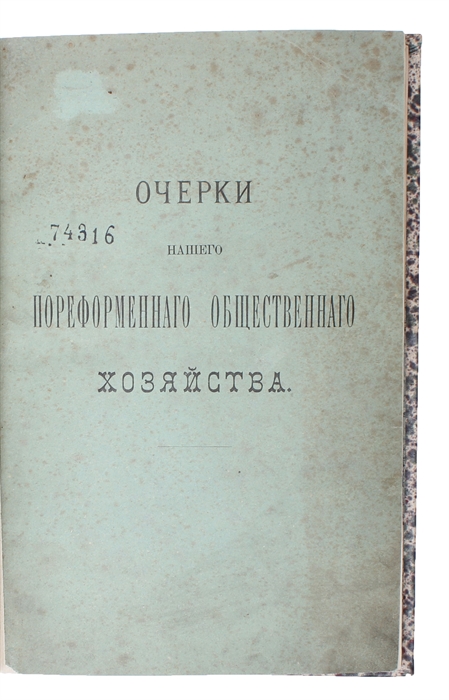THE BIBLE OF RUSSIAN LIBERAL ECONOMIC THOUGHT
NIKOLAJ - ON [DANIELSON, NIKOLAJ FRANCEVIC].
Otserki naschego poreformennogo obshcshestvennago chozjajstva. [Russian, i.e.: Studies of Our Post-Reform Economy].
S.-Petersburg, A Benke, 1893.
8vo. Bound with the original printed green front wrapper in a beautiful green half calf with gilt lettering to spine. Front wrapper brownspotted. Bottom 3 cm. of p.1-2 cut off, shaving a few lines off. A few underlinings to the first leaves. XVI, 353, (1) pp. + 29 tables, numbered I-XVI (with a,b,c's: IIIa-b, IVa-h, Va-c, VIa-b, VIIa-b, Xa-bXIIIa-b), on 16 leaves, 12 of which folded, most of them large + 2 leaves of explanation in between.
The exceedingly scarce first edition of Danielson's groundbreaking work on the Russian economic development, which is widely considered the bible of Russian liberal economic thought. Danielson here proposed a way for the Russian economy to consolidate itself without foreign money by - highly controversially - claiming that capitalist industrialization was possible without any change in the political system and emphasizing and defending the peasant class, which so many socialists of the time readily proclaimed doomed.
Danielson's economic philosophy was not only pioneering in contemporary Russian economics, it also anticipated many solutions to problems that still face some of the Third World countries today.
Danielson famously stated: "The problem facing us could have been summed up in the following terms: What should we do to bring our industry up to the level of Western industry, in order to prevent Russia from becoming a vassal of more advanced countries, and at the same time raise the living standards of the people as a whole? What we did, instead, was to identify large-scale modern industry with its capitalist form, thus reducing the problem to the following dilemma: To what should we sacrifice our cottage industries - to our own capitalist industry or to English industry? When the issue was presented in this way - and this is how it was presented - our cottage industries were doomed and we began to propagate our own capitalist industry". [The present work, pp. 390-91].
"[Danielson] reasserted that Russia allegedly lacked foreign markets and reaffirmed that furthering large-scale industry - that it, capitalist development - was prejudicial to Russia's interests. He further condemned the policy of industrialization based on "outrageous protectionism" and suggested that it was still possible for Russia to go back to reliance on agrarian communes and artisanal production. In sum, he believed that Russia could avoid becoming "a tributary of more advanced countries" and that it could foster a non-capitalist, state-controlled industrialization that would increase both productivity and welfare" (Spulber, "Russia's Economic Transitions", p. 43).
"[The present work] was written at the suggestion of Marx himself. Danielson made every effort to emphasize the differences between himself and the economic publicists who "defended the people's cause from a narrow peasant point of view". [He] lost no opportunity to refer to the authority of Marx and Engels, even quoting from his private correspondences with them. Nevertheless, there can be no possible doubt that Danielson belonged to the legal Populists". (Walicki, A History of Russian Thought, P. 432).
Danielson is often compared to Vasily Vorontsov and the two are considered the major exponents of narodnik economics. Danielson, however, should be distinguished from Vorontsov in regard to the factors that cause underconsumption: contraction in the purchasing power of the popular masses (and not the inability of capitalists to consume the surplus value). Danielson's analysis therefore falls into the school of underconsumption theory, initiated during the classical era of Political Economy by Sismonde de Sismondi. "According to Danielson, capitalist development reduces the number of workers (formerly self-employed craftsmen, small manufacturers, farmers or even laborers) through rapid increase in productivity. This leads to an ever smaller number of workers handling an ever larger mass of means of production, and accordingly also the number of mass consumers, since it marginalizes all those who are being pushed into the industrial reserve army, depriving society of their purchasing power. Crises therefore emerge as a result of contraction of the internal market and of popular consumption." (MILIOS, "Tugan-Baranowsky and effective Demand", p 4.). Danielson's analysis of the contraction of popular consumption linked his theory of crises with the Theory of Relative Pauperisation, thereby adopting a version of the "absolute immiseration" thesis.
Danielson - initially a self-proclaimed Marxist - translated Marx's "Das Kapital" into Russian just two years after the first German edition appeared (thus being responsible for the first translation of the work into any language) and corresponded heavily with Marx and Engels up until the end of their lives. He was their primary source of information on the economic situation and development in Russia. While Danielson's research progressed and his own economic philosophy developed, he moved away from the popular Marxist economic doctrine, however, and eventually the famed Marx-translator became the influential critic of Marxism.
The theory of Danielson's "Studies of Our Post-Reform Economy" represents "the first attempt to pose and find solutions to problems that still face some of the Third World countries today". Danielson was "the first to realize that economic backwardness creates its own specific problems, and that underdeveloped countries not only should not but cannot model their development on that of the advanced countries of Western Europe. (Walicki, "A History of Russian Thought", p. 434).
Order-nr.: 48290


![Otserki naschego poreformennogo obshcshestvennago chozjajstva. [Russian, i.e.: Studies of Our Post-Reform Economy].](/images/product/48290b.jpg)
![Otserki naschego poreformennogo obshcshestvennago chozjajstva. [Russian, i.e.: Studies of Our Post-Reform Economy].](/images/product/48290c.jpg)
![Otserki naschego poreformennogo obshcshestvennago chozjajstva. [Russian, i.e.: Studies of Our Post-Reform Economy].](/images/product/48290d.jpg)